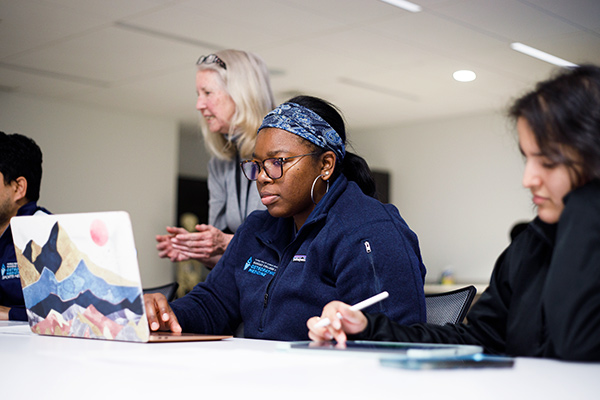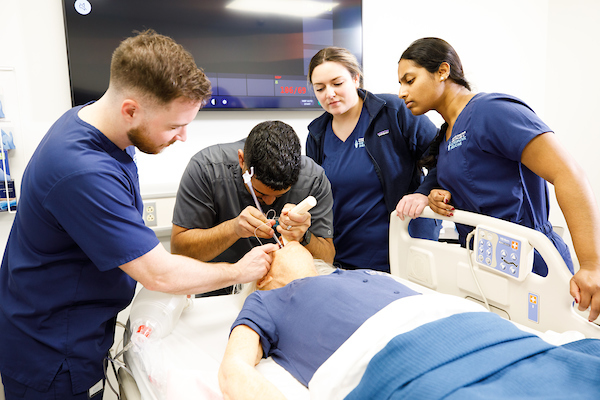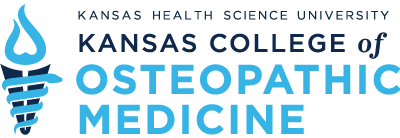Seeking Dedicated Future Physicians
KansasCOM is committed to its mission to train the osteopathic physician of the future to provide effective, empathic, and innovative care to optimize the health of patients and their communities. To help fulfill this mission, we maintain high standards for students admitted to KansasCOM. Graduates will be expected to not only provide top-quality health care services, but to also actively work in service to Kansas communities and beyond with cultural competence and compassion.
Our Standards
We have isolated several quantitative and qualitative factors that indicate if an applicant is a good fit for KansasCOM’s mission, including:
- Clear demonstration of academic success
- Research experience
- Leadership experience and skills
- Community service and involvement
- Exposure to the field of medicine
KansasCOM actively recruits students with a variety of backgrounds and experiences who demonstrate exceptional potential for becoming outstanding physicians. Grades and MCAT scores are important to us as they are some of the best predictors of success in medical school. We also consider the entirety of an applicant’s academic record and application materials to identify those with the potential to thrive in our program.
Application Requirements
The following is required for consideration for admission into KansasCOM.
GPA
Cumulative GPA requirement of 3.0 or above
Cumulative Science GPA requirement of 3.0 or above
Medical College Admissions Test (MCAT) score
MCAT requirement of 500 or above
MCAT scores are accepted three years prior to entry (i.e., for fall 2025 entry, scores need to be no older than January 2022).
Bachelor’s degree
Applicant must have or must be about to receive a bachelor’s degree from a regionally accredited college or university.
Prerequisite coursework
Satisfactory completion, with a grade of C or higher, of the following college or university courses, including laboratory work:
- Biological Sciences: 8 semester hours, including lab (12 quarter hours)
- Biochemistry: 3 semester hours (4.5 quarter hours)
- General Chemistry: 8 semester hours, including lab (12 quarter hours)
- Organic Chemistry: 8 semester hours, including lab (12 quarter hours)
- English or Literature: 6 semester hours (9 quarter hours)
- Social or Behavioral Sciences: 6 semester hours (9 quarter hours)
- Physics: 8 semester hours, including lab (12 quarter hours)
Total: 42 semester hours (63 quarter hours)
While not required for admission, additional preparation in anatomy, genetics, immunology, histology, and embryology will enhance fundamental preparation for the rigorous medical curriculum and is strongly encouraged.
Health care experience
Experience in health care shadowing, volunteer work, community service, etc.
Two letters of recommendation
Applicants must submit two letters of recommendation meeting the following requirements:
- One letter from a pre-med adviser or committee (applicant may substitute a science faculty member if one’s institution does not have pre-med advisers or a pre-med committee)
- One letter from a physician (DO or MD)
- Additional letters may be submitted on your behalf.
- Letters must be dated within two years of the student’s anticipated matriculation year (i.e., if the student is starting classes in fall 2025, letters must be dated no earlier than January 2023).
Casper
Although not required for admission, applicants are encouraged to submit a current Casper score for consideration. Casper is an online situational judgement test used to help evaluate applicants as part of the school’s application process. For more information about Casper and to register for the exam, please visit Acuity Insights.
Technical standards
Students must meet ALL terms of KansasCOM’s Technical Standards and agree to all terms outlined within the Technical Standards.
Recommended qualifiers
These items are recommended for increasing the competitiveness of your application:
- Minimum of 80 hours of shadowing with a physician
- Volunteer work completed in a health care related setting
- Work experience in a health care field (EMT, nurse, etc.)
- Minimum of two leadership roles in clubs, organizations, or work experience
- Involvement in a minimum of four community service organizations
- Research experience
- Domestic or international study or mission trip
- Commitment of more than two years to an organization, club, or job




